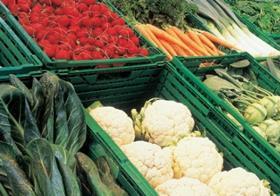
The Italian fresh fruit and vegetable export trade has been dealt a hammer blow by the E.coli crisis and the subsequent decision by Russia to ban all exports from the Euroepan Union, member of the trade have confirmed.
The country, which is one of Europe's leading supplier of fresh vegetables, plays a key role in providing a range of products to the continent's leading consumer markets and is currently building up to a summer campaign that remains crucial to the overall success of the industry.
At Verona Wholesale Market, which handles a significant volume of Italian fresh produce exports to other parts of Europe throughout the year, officials have reportedly seen a 20-30 per cent downturn in vegetable sales since the crisis began in late May.
In an interview with L'Arena, market traders representative Marco Marrapese said it was 'undeniable' that consumption levels had fallen, above all for salad vegetables which are traditionally eaten raw.
'Sales have contracted by around 20-30 per cent,' he noted, 'but the damage is even greater when you consider that, here at the beginning of summer, we were banking on an increase of 30-40 per cent, which instead hasn't materialised.'
With Turin-based newspaper La Stampa suggesting losses in the region of €3m per day, Italy's leading fresh produce trade association confirmed it had witnessed a major downturn in exports of fruit and vegetables since the start of the year, a trend largely attributed to the impact of the recent E.coli crisis on vegetable sales across Europe.
Luigi Peviani, head of Fruitimprese, told the Corriere Ortofrutticolo that an already challenging market in terms of demand had been made even more difficult as a result of the outbreak, which has spread fear and suspicion among consumers over the safety of salad vegetables in particular.
'It's the shortage of orders that makes us worry,' he commented. 'Our associates report fall in vegetable exports by 70-80 per cent and by 20-30 per cent for fruit.'
He continued: 'We could value the damage to Italian exports at around €12m, two-thirds of which is to Germany, since the beginning of the crisis. The worst thing is the severe fall in consumption evidently caused by panic about the bacterium. Prices have also fallen.'
Peviani also called into question the German authorities' handling of the crisis and its reporting about the outbreak through the media, adding that trade in products coming into Italy had also been affected.
'For example, in Italy supermarkets do not want products from Germany, Spain and the Netherlands,' he observed.



